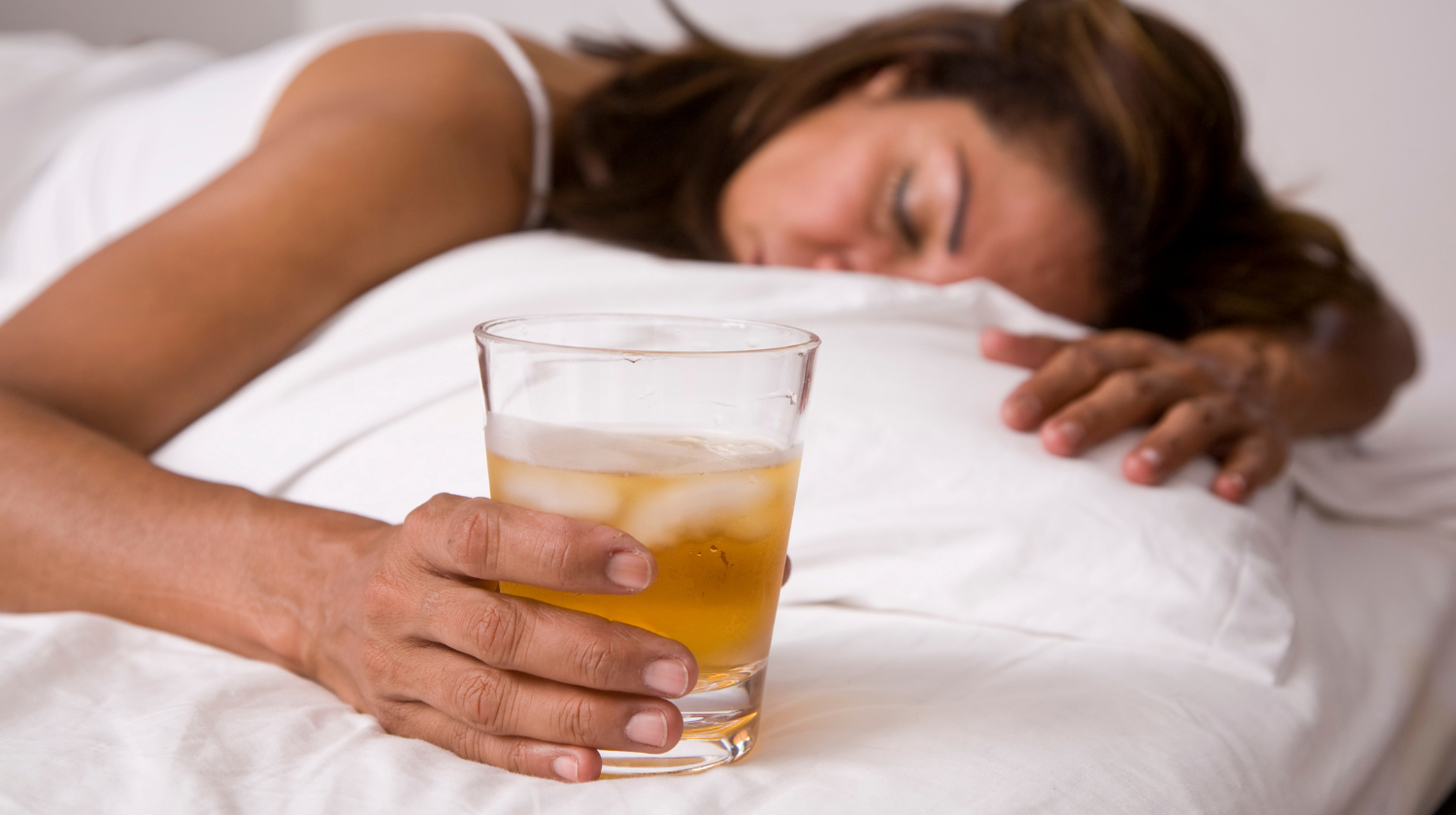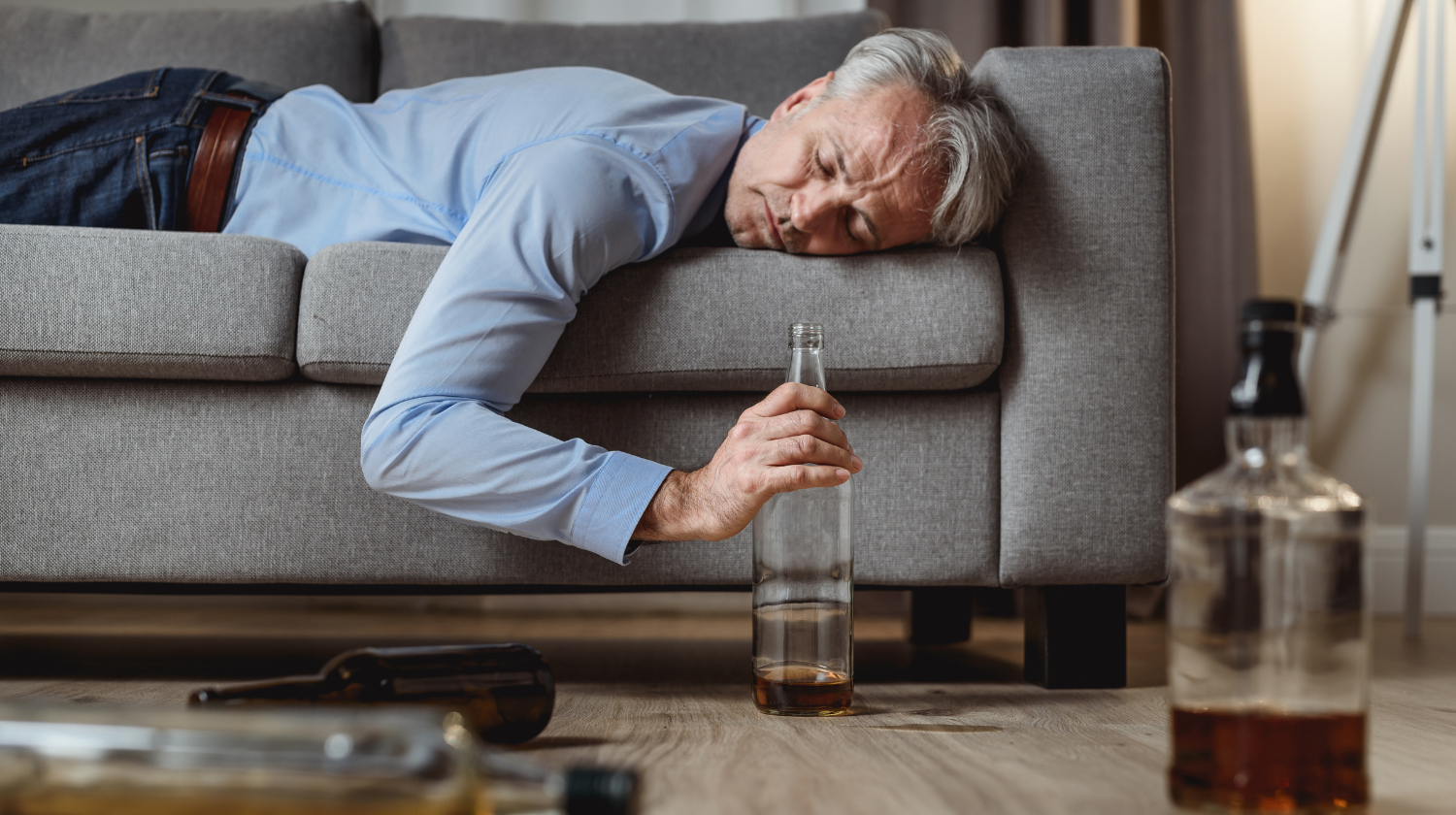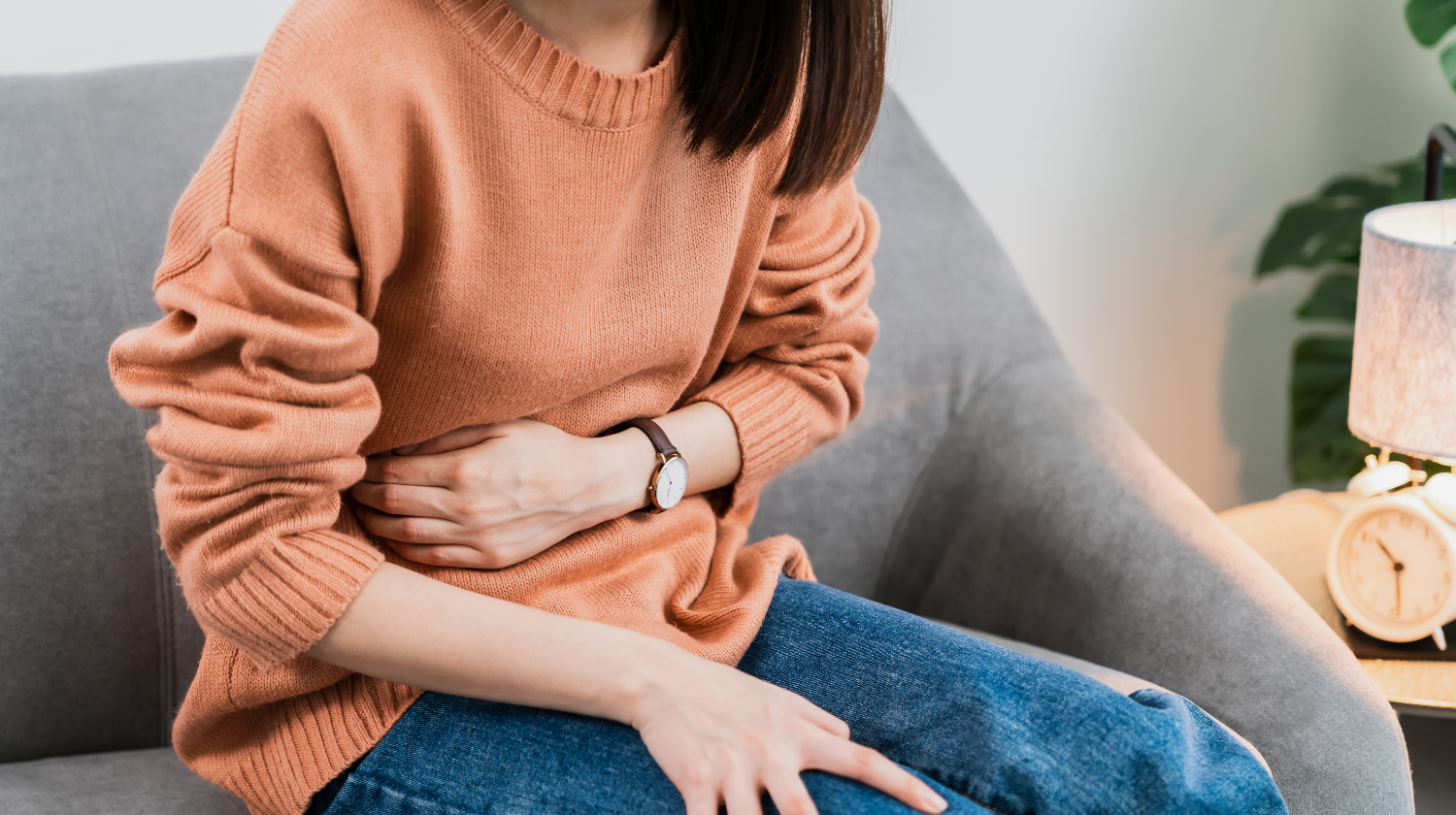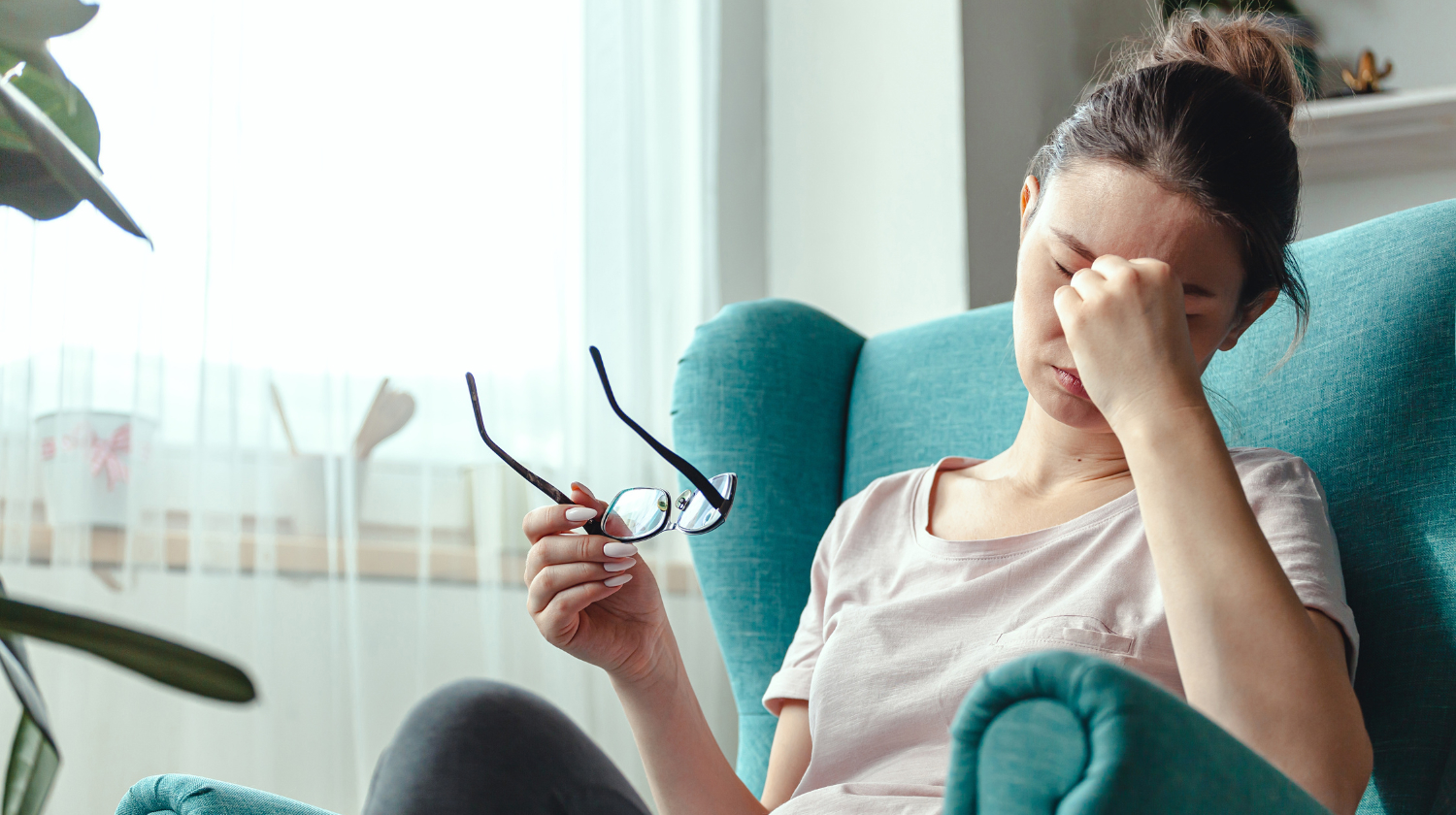Alcohol And Anxiety: The Connection You May Not Know 2024

It’s no secret that alcohol can make you feel relaxed and carefree, but have you ever noticed how your anxiety comes back tenfold the next day? It’s a vicious cycle that can leave you feeling trapped and helpless.
It’s become the norm to reach for something when stressed. Just think of how drinking went up during the pandemic,[1] along with most people’s weight.
Unfortunately, most of us weren’t taught how to regulate our own emotions, making us reach for something external to calm ourselves. Luckily, we can learn new ways to manage anxiety without alcohol.
In this article, we will talk about the link between alcohol and anxiety and how to stop turning to it whenever stressed, with quick tips to reduce depression and anxiety.
Does Alcohol Cause Anxiety?
Whether it’s after one night of drinking too much or long-term alcohol abuse, alcohol can cause anxiety.
It can worsen symptoms of a current anxiety condition, as well as heighten the risk of developing an anxiety disorder.
It disrupts brain and hormonal function, gut symbiosis, energy levels while increasing the risk of various ailments and chronic health conditions. Alcohol’s side effects and health issues can also increase stress, anxiety, and depression.
The Links Between Alcohol And Anxiety
Countless research studies have confirmed that alcohol and anxiety go hand in hand, each affecting the other. Here, we’ll cover what exactly happens in your body when you drink alcohol and three ways it affects your mental health.
How Does Alcohol Affect Anxiety?
Alcohol is a depressant[2] that affects the central nervous system. It quickly absorbs into the bloodstream and affects different neurons in the brain, including those that control your mood, memory, judgment, and inhibitions. It can easily disrupt the delicate balance of chemicals in the brain that regulate mood and anxiety.
Initially, Alcohol Helps You Relax

When you start drinking alcohol, you might feel temporary relaxation or relief from anxiety. That’s because it increases a neurotransmitter called gamma-aminobutyric acid,[3] or GABA, which slows certain neurons and acts like a sedative.
It also slows your heart rate and breathing, so you usually feel calmer after a drink or two.
Alcohol even releases dopamine,[4] giving you that euphoric feeling. It’s also another reason why alcohol and social anxiety are so commonly seen together — it becomes much easier to talk to people and get rid of those nervous feelings after a drink or two.
Of course, this initial calm trains your brain to associate alcohol with pleasure, which can lead to addiction and the need for more.
Anxiety Can Cause Alcohol Cravings

People turn to alcohol when stressed[1] for a reason. On top of it being available everywhere and socially acceptable, it can offer quick anxiety relief. After all, the more stressed you are, the more likely you are to get headaches and feel tired, anxious, and depressed.[5]
Naturally, you will want something to help take that away, whether it be food or alcohol for anxiety relief.
Alcohol And Anxiety Become A Cycle

As the initial alcohol and anxiety relief effects wear off, that sense of calm can be reversed. Excessive alcohol use can cause
- Anxious hangovers.
- Reduced motivation and cognitive capabilities.
- Poor choices through a lack of future-oriented thinking.
There are other effects that increase anxiety — such as exhaustion, headaches, and dehydration. Unfortunately, this can turn into physical and mental dependence, where you crave more for relief from alcohol withdrawal. But there’s no such thing as an alcohol anxiety cure.
Can Alcohol Make Anxiety Worse?
Alcohol alters the neurotransmitters serotonin and dopamine, which help to regulate mood. Regular heavy drinking can also lead to long-term structural and brain chemistry changes[6] that increase symptoms and the risk of developing anxiety disorders.
Your gut microbiome[7] also affects anxiety and depression, and since alcohol causes microbiome imbalance,[8] it’s highly possible that anxiety can worsen. After all, your gut is called your second brain[9] for a reason. Without proper nourishment and rest, many health conditions can worsen.
Can Alcohol Trigger Anxiety?
It’s often assumed that alcohol consumption has no extreme negative effects unless you’re a heavy long-term user. Unfortunately, that’s not true. While it might take some time for certain side effects to appear, alcohol-induced anxiety can occur even after one night of drinking.
Since it’s a depressant and slows the central nervous system, you can quickly feel more anxious or sad after even one night of drinking, as well as long-term.
Alcohol And Anxiety Attacks
Alcohol can create symptoms such as increased heart rate, shaking, and sweating, which closely mimic the symptoms of panic attacks. GABA is initially stimulated by small amounts of alcohol, which cause you to feel relaxed. However, heavier drinking causes it to become depleted, making you feel tense and panicked.
In general, if you have a panic disorder or any type of anxiety disorder, it’s best to avoid alcohol completely. As well, alcohol and anxiety medication can interact, worsening its side effects and the risk of panic attacks.
If you notice the typical symptoms[10] of anxiety start arising, like obsessive thinking, chest pains, and breathlessness, know that you can take steps to calm yourself. Breathing exercises, talking to friends, hugging, humming, or gently putting your hand on your heart can also help to put your nervous system in a parasympathetic state.
Other Risks Of Alcohol Abuse
There are many other physical and mental health risks associated with alcohol use disorder, such as:
Digestive Issues

Alcohol causes a gut microbalance,[8] which makes stress harder to manage and mood disorders worsen. Still, it can also create any of these conditions:[11]
- Gastritis.
- Acid reflux.
- Malnutrition and B-vitamin deficiency.
- Worsened irritable bowel syndrome and irritable bowel disease symptoms.
Fortunately, these issues can be managed with a healthy diet, exercise, stress-reducing practices, and alcohol abstinence.
Fatigue, Inflammation, Chronic Diseases

Chronic alcohol use can cause various physical health issues, such as
- Headaches.
- Weight gain.
- Chronic fatigue.
- Aches and pains.
- Increased risk of chronic diseases and cancer.
- Worsened medical condition symptoms, such as those with arthritis and diabetes.
Naturally, any of these conditions themselves can take a toll on your mental health. The stress of managing exhaustion, fatigue, headaches, or a chronic health condition can lead to an increased risk of depression[12] and generalized anxiety disorder.
Sleeping Difficulties

At all dosages, alcohol affects your sleep by disrupting sleep homeostasis.[13] It might make it easier to fall into heavy sleep at first, but it disrupts your second half of sleep. It can also cause
- Insomnia.
- Excessive daytime sleepiness.
- Delayed and reduced rapid eye movement or REM sleep.[14]
Quality of sleep[15] is reduced, which affects a multitude of bodily functions, such as memory formation, cognitive capabilities, slowed reaction time, and of course, your mood. After all, we all know how easy it is to snap and feel cranky after a bad night’s sleep.
Loss Of Motivation

Dopamine works directly with your brain’s reward center, affecting how you think, work, sleep, learn, and even how rewarded you feel when you reach your goals. Since dopamine is affected by alcohol, it can become harder to carry out thought tasks, solve problems, and feel motivated or rewarded.
Ways To Reduce Anxiety Safety
Living a healthy lifestyle gives you the best chance at improving dopamine levels and efficiency. Of course, that’s easier said than done, especially when you’re feeling anxious. Luckily, the best way to start any new habit is to start slowly,[16] focusing on one easily maintainable goal.
Think about the easiest first step toward reducing stress and start there. That could mean trying out a free online therapy session, a two-minute guided meditation, or a five-minute walk in the park after dinner to avoid mindless stress-eating at night.
Here are some habits to think about starting to help with stress reduction:
- Schedule a medical check-up — get a full analysis to test for underlying conditions that may be leading to anxiety or alcohol use (nutritional deficiencies, thyroid issues, etc.).
- Try therapy — a mental health professional can teach you healthy tools to cope with stress. You can get a free first session or try an online group therapist for a cheaper option.
- Prioritize sleep — create a nighttime routine and think about setting the alarm one hour before sleeping to remind yourself to get off of screens and have quiet time.
- Exercise — anything from a light walk to kickboxing will release tension. Aim for 150 minutes a week, spread out however you like.
- Eat well — slowly add more nutrient-dense foods to your meals, like fruit for dessert and extra veggies with every lunch or dinner.
- Practice stress-relieving activities — start with a few minutes a day of meditation, breath work, calming music, or even yoga to activate your relaxing parasympathetic nervous system.
- Go to nature — quiet time in green space is the most underrated anti-anxiety drug available. Even 10 minutes a day[17] can reduce cortisol levels, the stress hormone.
- See friends — social support is intricately tied to mental health. The more friendly faces you see and the emotional support you get, the better you’ll feel.
- Download mindful drinking apps — you don’t need to go cold turkey unless you’re medically directed. Apps that offer community and professional support and let you track your habits can help you drink more mindfully.[18]
- Express your emotions — journaling, free-writing, and communicating your feelings will help you become comfortable expressing yourself and release pent-up tension.
Finally, be compassionate with yourself as you try a new habit. It’s not something to roll your eyes at — research shows[19] compassion is key to regulating emotions and developing resilience.
Remember — being overly harsh and critical of yourself won’t help anxiety and depression.
Finally, if you feel drinking interferes with your life, get free 24/7 support at 1-800-662-HELP[19] and check out free support groups. You can also find free drug and alcohol rehab centers[20] throughout the country.
The Bottom Line
If you’re wondering,” does alcohol increase anxiety?” the answer is yes, both in the short and long term. Alcohol negatively disrupts brain and hormonal function, gut health, and energy levels. It also increases the risk of various ailments and chronic health conditions.
Even if it’s just one night of drinking too much, you can lose a good night’s sleep, make poor food choices, feel anxious, and get a headache or stomachache.
Fortunately, the majority of the cognitive impairments created by alcohol can be reversed[21] with abstinence. Hormone functioning and gut health also improve with a healthy lifestyle, like adding more nutrient-dense foods, exercising, sleeping well, and practicing stress-reducing activities regularly.
Healthy habits help calm your nervous system and allow your body to function at its best, making it easier to manage stress and naturally improving your mental health.
If you’re feeling stressed and anxious or have trouble controlling your alcohol intake, speak to a medical doctor and psychologist about your treatment options.
+ 21 sources
Health Canal avoids using tertiary references. We have strict sourcing guidelines and rely on peer-reviewed studies, academic researches from medical associations and institutions. To ensure the accuracy of articles in Health Canal, you can read more about the editorial process here
- Apa.org. (2021). Available at: https://www.apa.org/news/press/releases/stress/2021/sia-pandemic-report.pdf.
- nidirect. (2017). What happens when you drink alcohol. [online] Available at: https://www.nidirect.gov.uk/articles/what-happens-when-you-drink-alcohol.
- Olsen, R.W. and Liang, J. (2017). Role of GABAA receptors in alcohol use disorders suggested by chronic intermittent ethanol (CIE) rodent model. Molecular Brain, [online] 10(1). Available at: https://molecularbrain.biomedcentral.com/articles/10.1186/s13041-017-0325-8.
- Ma, H. and Zhu, G. (2014). The dopamine system and alcohol dependence. Shanghai archives of psychiatry, [online] 26(2), pp.61–8. Available at: https://www.ncbi.nlm.nih.gov/pmc/articles/PMC4120286/.
- America, in (2022). Stress in America 2022. [online] https://www.apa.org. Available at: https://www.apa.org/news/press/releases/stress/2022/concerned-future-inflation.
- Jauhar, S., Marshall, E.J. and Smith, I.D. (2014). Alcohol and cognitive impairment. Advances in Psychiatric Treatment, [online] 20(5), pp.304–313. Available at: https://www.cambridge.org/core/journals/advances-in-psychiatric-treatment/article/alcohol-and-cognitive-impairment/6BE0E77B493DCF472D91323AFED402CF.
- Foster, J.A. and McVey Neufeld, K.-A. (2013). Gut–brain axis: how the microbiome influences anxiety and depression. Trends in Neurosciences, [online] 36(5), pp.305–312. Available at: https://www.sciencedirect.com/science/article/abs/pii/S0166223613000088.
- Qamar, N., Castano, D., Patt, C., Chu, T., Cottrell, J. and Chang, S.L. (2019). Meta-analysis of alcohol induced gut dysbiosis and the resulting behavioral impact. Behavioural Brain Research, [online] 376, p.112196. Available at: https://www.sciencedirect.com/science/article/abs/pii/S0166432819311647.
- Harvard.edu. (2017). The Gut and the Brain. [online] Available at: https://hms.harvard.edu/news-events/publications-archive/brain/gut-brain.
- NHS Choices (2023). Anxiety, fear and panic. [online] Available at: https://www.nhs.uk/mental-health/feelings-symptoms-behaviours/feelings-and-symptoms/anxiety-fear-panic/.
- Bishehsari, F., Magno, E., Swanson, G., Desai, V., Voigt, R.M., Forsyth, C.B. and Keshavarzian, A. (2017). Alcohol and Gut-Derived Inflammation. Alcohol research : current reviews, [online] 38(2), pp.163–171. Available at: https://www.ncbi.nlm.nih.gov/pmc/articles/PMC5513683/.
- Cleveland Clinic. (2021). Chronic Illness and Depression: Causes, Symptoms, Treatment. [online] Available at: https://my.clevelandclinic.org/health/articles/9288-chronic-illness-and-depression.
- Ebrahim, I.O., Shapiro, C.M., Williams, A.J. and Fenwick, P.B. (2013). Alcohol and Sleep I: Effects on Normal Sleep. Alcoholism: Clinical and Experimental Research, [online] 37(4), pp.539`549. Available at: https://onlinelibrary.wiley.com/doi/abs/10.1111/acer.12006.
- Barbato, G. (2021). REM Sleep: An Unknown Indicator of Sleep Quality. International Journal of Environmental Research and Public Health, [online] 18(24), p.12976. Available at: https://www.ncbi.nlm.nih.gov/pmc/articles/PMC8702162/.
- Cleveland Clinic. (2022). Sleep Deprivation: What It Is, Symptoms, Treatment & Stages. [online] Available at: https://my.clevelandclinic.org/health/diseases/23970-sleep-deprivation.
- Breaking Bad Habits (2017). Breaking Bad Habits. [online] NIH News in Health. Available at: https://newsinhealth.nih.gov/2012/01/breaking-bad-habits.
- ScienceDaily. (2020). Spending time in nature reduces stress. [online] Available at: https://www.sciencedaily.com/releases/2020/02/200225164210.htm.
- Kamboj, S.K., Irez, D., Serfaty, S., Thomas, E., Das, R.K. and Freeman, T.P. (2017). Ultra-Brief Mindfulness Training Reduces Alcohol Consumption in At-Risk Drinkers: A Randomized Double-Blind Active-Controlled Experiment. International Journal of Neuropsychopharmacology, [online] 20(11), pp.936–947. Available at: https://www.ncbi.nlm.nih.gov/pmc/articles/PMC5737497/.
- National Treatment Referral Routing Service All Ages – Greater Williamsburg Network of Care, Virginia. (2022). National Treatment Referral Routing Service All Ages – Greater Williamsburg Network of Care, Virginia. [online] Available at: https://gwcac.va.networkofcare.org/mh/services/agency.aspx?pid=NationalDrugandAlcoholReferralRoutingServiceemclasssdAllAllAgesem_963_2_0.
- American Addiction Centers. (2023). Free Drug and Alcohol Rehab Centers. [online] Available at: https://americanaddictioncenters.org/rehab-guide/free.
- Petit, G., Luminet, O., Cordovil de Sousa Uva, M., Zorbas, A., Maurage, P. and de Timary, P. (2017). Differential spontaneous recovery across cognitive abilities during detoxification period in alcohol-dependence. PLOS ONE, [online] 12(8), p.e0176638. Available at: https://journals.plos.org/plosone/article?id=10.1371/journal.pone.0176638.



